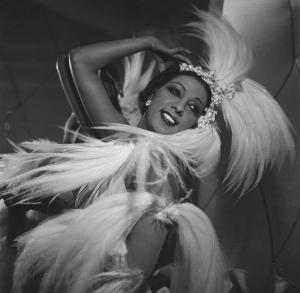In honor of Women’s History Month, the Carolina Women’s Center is featuring blog posts by UNC student Lydia McInnes. Lydia’s writing celebrates some notable women throughout history. In remembering their actions, we honor their memory and their contributions to all women.
Josephine Baker

Born: St. Louis, Missouri on June 3, 1906 (birth name: Freda Josephine McDonald)
Died: Paris, France on April 12, 1975
Occupation: Singer, Dancer, Civil Rights Activist
Notable Quote: “Surely the day will come when color means nothing more than the skin tone, when religion is seen uniquely as a way to speak one’s soul, when birth places have the weight of a throw of the dice and all men are born free, when understanding breeds love and brotherhood.”
Why you should know about her:
Josephine Baker spent her early life in poverty, working as a nanny and caretaker for wealthy white families in St. Louis, before going on to become one of Europe’s most popular and highest paid performers. She started dancing at 13 and began touring the US in 1919 before moving to France to pursue her career away from the racist jeers and disdain of white Americans.
She catapulted herself to fame in 1926 by dancing in a skirt made out of 16 bananas – and little else – before moving on to sing and dance in French stage performances and films. Baker, like many other black performers of the age, was welcomed in Paris due to her “exotic” nature and appearance – she was dubbed the “Black Venus” and the “Black Pearl” by audiences – leaving her to walk the fine line between representation and exploitation.
This fantasized (and fetishized) version of blackness that French audiences wanted may have given her fame, but it wasn’t the only way she left her mark France. Baker also worked for the Red Cross and the French Resistance during the WWII Nazi occupation of France, and she was a sub-lieutenant in the Women’s Auxiliary Air Force. After the war, she was awarded the Croix de Guerre and the Legion of Honor, two of France’s highest military honors for her service during the war.
She returned to the US during the 1950s and ‘60s to participate in the boycotts, protests, and marches of the Civil Rights movement. She marched on Washington alongside Martin Luther King, Jr., on the day of his “I Have a Dream” speech and helped the cause so much that the NAACP named May 20th Josephine Baker day in her honor. She performed at a packed Carnegie Hall crowd in New York in 1973 after decades of racist rejection and then returned to her home in the French countryside with her 12 adopted children from countries around the world.
She died at age 68 in 1975, just after the 50th anniversary of her Paris debut. Over 20,000 Parisians lined the streets to view her funeral procession. She was honored with a 21-gun salute by the French government, making her the first American woman in history to be buried in France with military honors. More than just a pretty face and a good voice, Josephine Baker was a true Freedom Fighter, a champion of civil rights, and a woman whose name should not be forgotten.